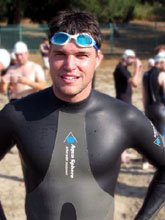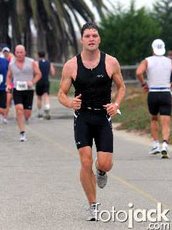A reader named Jeff submitted a couple of questions about my periodization tip from a few weeks ago.
1) How much fitness is enough? Do we really have to keep improving? Eventually, our bodies age to the point where we can't keep up the same intensity (I am starting to feel this now). Is there some safe plateau?
I guess I'd say that ideally you're keeping up an activity level that is challenging and yet enjoyable throughout most of your life; that's certainly my goal. I do believe that many of the effects we usually chalk up to 'aging' may largely be due to inactivity. It's been shown, for instance, that resistance training can virtually arrest the muscle atrophy that's commonly associated with getting older, and if you are consistent with an exercise program throughout your life, you can maintain and even continue to gain muscle mass and tone very late in life. It's important that you don't slow down, however. Loss of fast-twitch (power) muscle fibers accelerates as you age if you don't use them... that's why the competition in the "over 75" division in Olympic powerlifting events tends to be fairly slim.
Constant improvement I believe SHOULD be a goal. Maybe you're not bench pressing as much at 75 as you were at 25, but maybe your form is better, maybe your posture has improved, maybe you're bringing more awareness to your movement. That's an improvement. And if it's impossible in one activity or sport, or if your knees can't take running any more, try another activity.
Your "safe plateau" question is a good one. Sure, there probably is a point where it's okay to slow down a little, not hammer it so hard, explore gentler activities like T'ai Chi, enjoy your outdoor time instead of trying to beat 15:00 in the 5K. It's probably easy for me to say as a young(ish) buck of 36, but I think the body can keep teaching us things right on through our lives, and to that end we SHOULD rage against the dying of the light -- fight against the downward spiral into permanent sedentarydom. Even as we respect and acknowledge whatever perceived limitations we might develop, we can still push up against them, challenge them, refuse to be imprisoned by them.
The parameters for exercise for health that doctors recommend are actually quite minimal: something like 3x a week, 20 minutes at a stretch, doing something like brisk walking. I don't know how they come up with these figures, but presumably they're based on research; ie, studies ha ve shown that someone who strolls twice around the block three times a week has a marginally longer lifespan than someone who's completely sedentary. To me those exercise parameters make almost no sense. If someone spends a single hour a week doing the most moderate of moderate exercise and the other 167 hours a week sitting or lying down, isn't that person by definition "sedentary?" Isn't the walking part of their lives the anamolie and the sitting part the norm?
So yes, there's probably a safe plateau -- some minimal level of fitness that will probably make you marginally less likely to die young. But I'm not really interested in advocating that type of fitness program. I'm much more interested in helping people enjoy their bodies, have FUN moving and exercising and being active right up until the moment they check out rather than just hanging in there for a few more episodes of "The Price Is Right."
2) With periodization, do you have completely stop an activity? Does it count if you do things at the same time (like running and weights, or swimming and biking)?
Sure! My definition of "periodization" is actually quite broad. Many exercise physiologists would say that switching from doing 3 sets of 10 reps to 4 sets of 6 reps on the bench press is enough of a shift to keep your body guessing, to avoid injury, to stave off boredom, etc., and would call that a "period shift." And they're probably right, because they've done the research. My point is that variation is almost always beneficial, whether it's a small change (changing acute program variables like sets and reps) or a big one (giving up biking for mountain climbing). So by all means, keep up your volleyball while doing T'ai Chi, keep up swimming while lifting weights. It's all going to help and support your other activities.
3) What's an optimal period before switching?
Exercise phys. people would tell you that in six weeks, the body has done all the adapting it's going to do to a given program, and that period is much shorter in highly trained athletes -- more like three weeks. But as I noted above, your "period shift" can be subtle: if you're a runner, you can break your daily 3 miles into three one-mile bursts. Or slow it down and do a fourth mile. Or so super-fast windsprints. Or run hills. Or change it up so that you're doing different lengths and different intensities all the time. Even going the opposite direction around the block is a change.
Thanks for your questions!
Saturday, June 09, 2007
Subscribe to:
Post Comments (Atom)




No comments:
Post a Comment